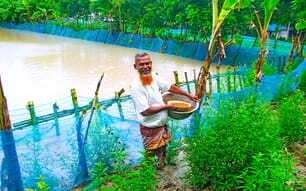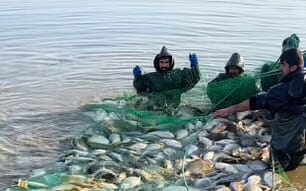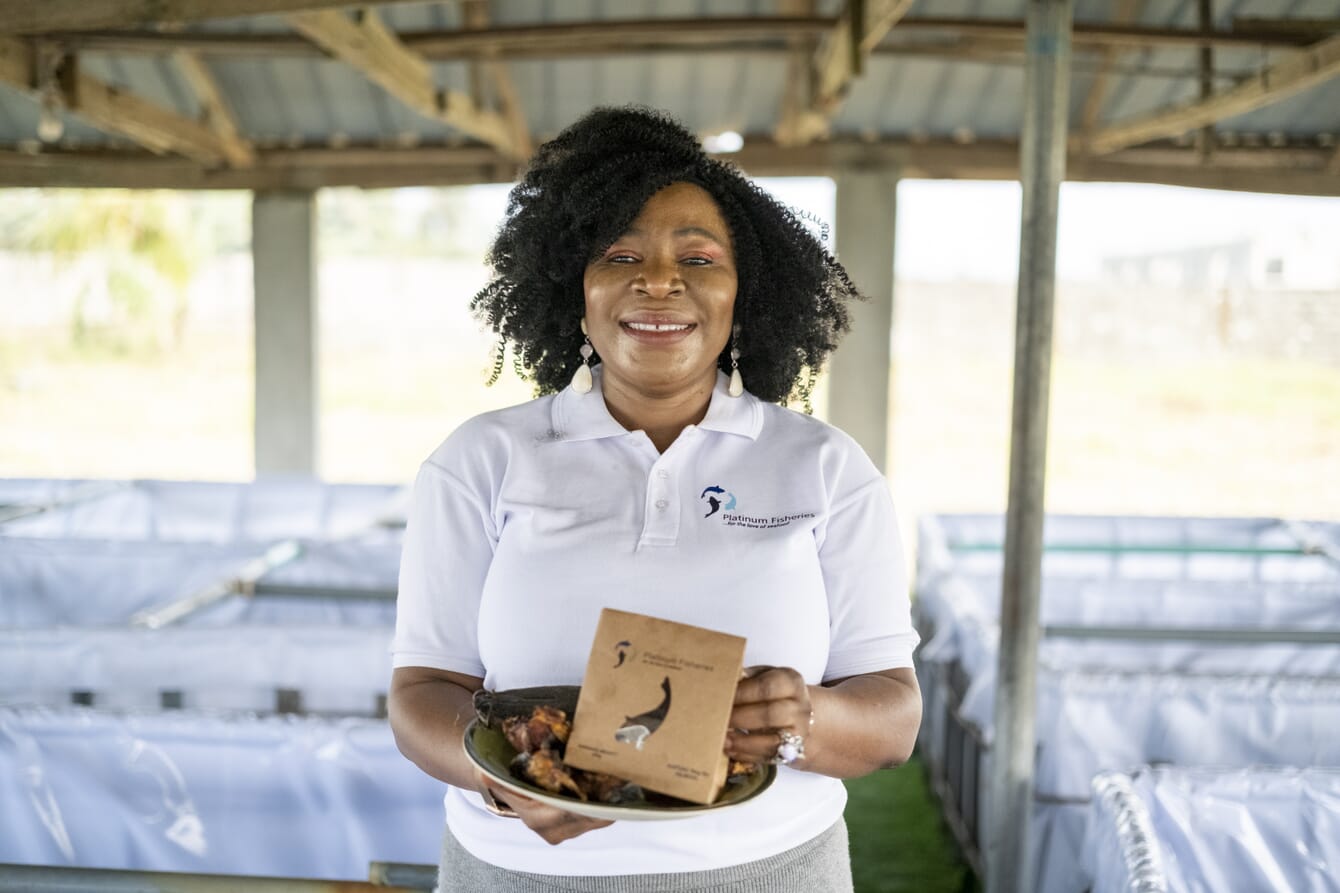
© Platinum Fisheries
Which species do you produce?
We currently have 31 ponds where we raise mainly catfish and tilapia. We also have our own hatchery where we produce at least 100,000 fingerlings monthly. In R&D mode, we have raised mackerel [Scomber scombrus] and shrimp as well. Our growth strategy includes producing at least 10 varieties of seafood in a recirculating aquaculture system within the next 24 months.
What is the total size of the farm?
We operate from a two-hectare farm and we are currently utilising about 45 percent of that capacity. We are consciously conserving our space to accommodate our planned infrastructure growth for production, chilling, industrial water filtration, organic waste management, and value-adding facilities.
How many tonnes do you harvest per year?
Our total harvest in 2017 was 5 metric tonnes and we were so excited about achieving that and of future possibilities. We closed 2023 with 390 tonnes, despite a sudden and acute downturn in the economy and the many growth changes our business was undergoing at the time.
Can you provide more details about your work with shrimp?
We test-produced 500 kg of shrimp over a period of nine months. Wild shrimp are severely over-fished in Nigeria and the demand for shrimp is met by imports, which has implications for not just the pricing level, but for scarce foreign exchange balance. So, there is a compelling reason to produce shrimps for local consumption and exports.
Why did you decide to move to RAS technology?
It was a matter of progression for us. Our earthen-ponds operations enabled us to commence operations relatively quickly and establish our ethical and sustainability commitments. We were able to mimic nature in a controlled, efficient and affordable way.
We will continue farming fish in existing ponds for different purposes - farming, sorting and holding stock, and for our training and monitoring programmes. However, RAS [she is aiming to build modular systems each of which can produce 300 tonnes of fish a year, and will cost roughly $180,000] is our future and we are almost in it. Deployment will be quick, with minimal disruption to our harvests and other trade cycles.
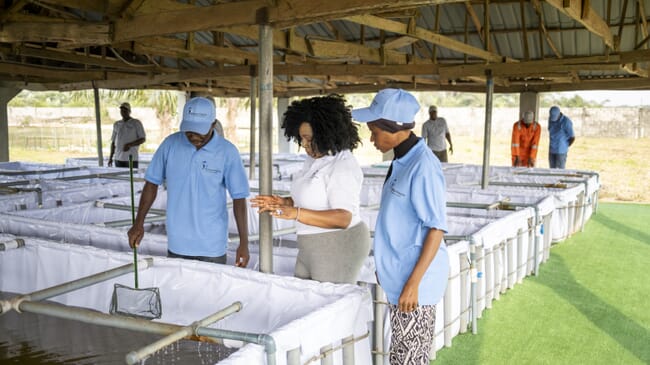
© Platinum Fisheries
How do you compare tilapia with catfish?
There is great demand for both products. Catfish is more rugged during production, hence more favoured in the aquaculture industry. It also grows bigger than the average tilapia, so I would say catfish is currently winning the race. However, tilapia enjoys a high demand and price per kg [typically around $1.2 per kg for tilapia compared to $1 per kg for catfish, although this is liable to fluctuate].
Where is the market for your fish?
Platinum Fisheries operates a B2B business model, selling to off-takers, major wholesalers, hotels, and other hospitality businesses. We are highly sought after, with demand constantly outstripping available supply volumes. Our clients would book weeks and sometimes, months in advance, making commitment payments to secure their purchase. However, it has been difficult to pass all the increased cost of operations to them, whilst we watch them increase their prices over threefold in their markets. That is why it is a very interesting market. Having said that, I appreciate their logistics and other distribution costs.
Do you export any of your fish?
Supplying specific clients in the United Kingdom and France was part of an experiment to walk-through the export process, engage regulatory systems and establish a test case for viable exports. However, this level of trade requires a quantity that justifies the distribution costs. This is our next level of operation which we aim to achieve once our RAS is established.
Are there challenges in your ponds?
We have predators – from birds to frogs, monkeys, snakes and monitor lizards. Most of these can simply be prevented by fine nettings over the ponds as soon as culturing commences, but we sometimes make space for nature. We famously have some flying geese that lay their eggs on our farm. It has been a privilege to watch them thrive. Monkeys also enjoy the green belt we maintain on the farm. We relocate some of the larger predators to the wild wherever it is possible.
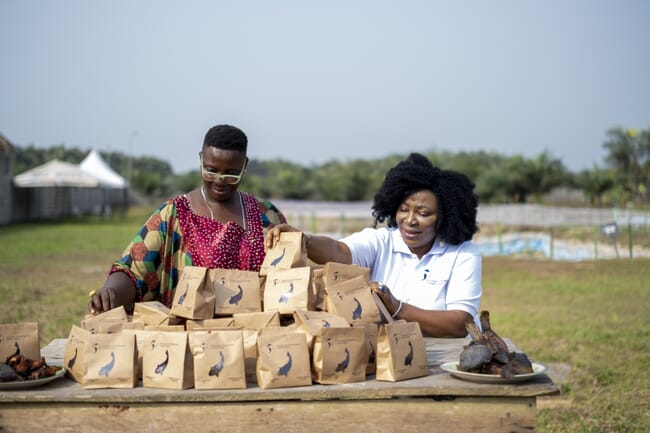
© Platinum Fisheries
Which kind of feeds do you use and where do you buy them?
We currently have a 1,000 kg/hour feed mill that drives over 95 percent of our operations. We source the majority of our raw materials locally, ensuring that they meet our high clearing quality assurance standards. We keep evolving and are also currently researching alternative sustainability-compliant feed options including plants and insect-based feed. This is important for our planned scaling.
We acquired our feed mill for two main operational reasons: to assure quality of feed for our livestock and to eliminate the effects of sudden and prolonged feed scarcity, which has been on the increase since Covid-19 and the conflicts in Europe. However, we still source imported feed for our hatchery, as juveniles need a very specific type of feed.
How many employees do you have?
We have 17 permanent staff and can have up to 25 staff during harvests and other project-based tasks.
Can you tell me a bit about your background?
I have graduate degrees in mathematics and in economics, post-graduate degrees in supply chain management and business strategy. I have attended Harvard Business School, INSEAD and China-Europe International Business School. It has been a long road from the inner-city high school I attended, and I am ultra-aware of my educational journey and how it has evolved my worldview. I come from a big family where our joint ethos includes integrity and centring family above everything else. I am married with two daughters.
When did you venture into aquaculture?
My vision for Platinum Fisheries was entrenched in a desire to create a seafood sourcing ecosystem that was at industrial-scale, inclusive and responsible.
My journey into aquaculture is paved with all my life experiences from my childhood including my innate passion for conservationism; my early incursion in agriculture (my father who taught us to ethically source food in our gardens); my intensive stint in trade from an early age; and my corporate experience in process re-engineering/management, human capital management, supply chain management, business strategy and consulting. What ties all of these together is my drive to solve problems.
Having experienced hunger as a child, and seeing the escalating problem of food poverty in Nigeria, I felt I was uniquely positioned to address this problem. I deeply researched the field of aquaculture with ethical and sustainable operations as my focus points. This founding commitment is what drives our team and our stakeholders.
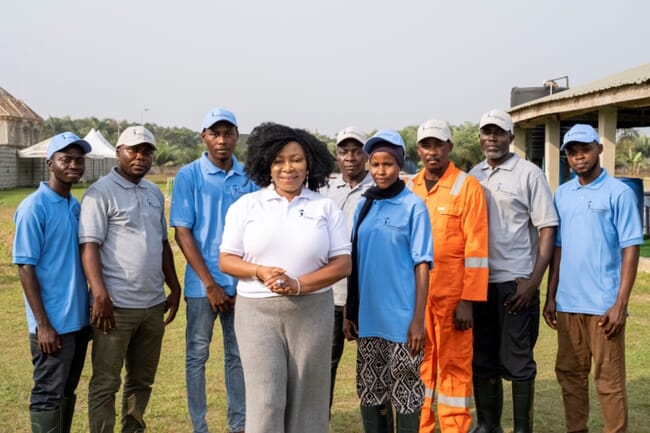
© Platinum Fisheries
What challenges do you think are encountered by women in aquaculture?
Aquaculture is a male-dominated industry; so one can say I am disrupting the space with Platinum Fisheries. Sourcing funds to scale is spectacularly challenging for a woman in aquaculture. Establishing one’s voice and facts-backed leadership is an uphill task for women. Building a team with the unique skillset required for world-class operations is also a challenge.
My mission is to equip the women I am privileged to engage, train or mentor with the skills/knowledge to overcome these challenges.
Have you achieved recognition for your work?
I won an award from the prestigious Cartier Women’s Initiative (CWI) for the Anglophone & Lusophone Africa category. There were tens of thousands of applicants and the rigorous application process included multi-stage submissions, jury pitches, and due diligence clearance. This award, which took place in Paris, was in recognition of our commitment to impact-led business and our focus on zero hunger, climate action and life below the sea (Sustainable Development Goals 2, 13 and 14). The award included financial, human and social capital support. By this award, I felt seen, recognised, validated, and most importantly supported to continue to deepen my vision and commitment to ethical and sustainable operations.
What advice do you give to those who are intending to venture into aquaculture?
Please do your product and market research, be realistic with the depth of costs and conservative with profit margin projections. Also, be driven by resource use responsibility and be very kind to our environment; it matters.
What are your future plans?
I want to profitably scale our production capacity, deepen our ethical/sustainability ethos and evangelise sustainable aquaculture. We are committed to combatting food insecurity in Africa, enshrining climate action throughout our operations, preventing over-fishing in the wild, saving endangered sea life species and supporting fishing communities to transition to ethical and sustainable aquaculture.
To that end, I invite stakeholders in funding ventures, aquaculture, and feed production value chains to reach out to me at dupekilla@gmail.com to explore exciting partnership opportunities.


